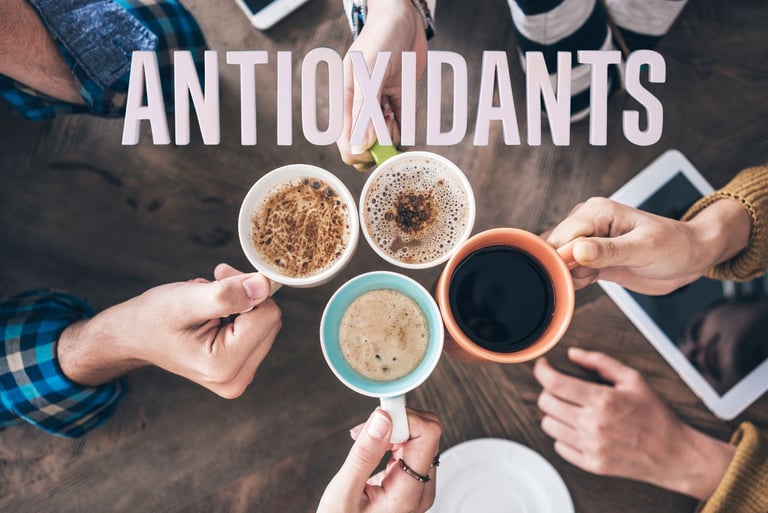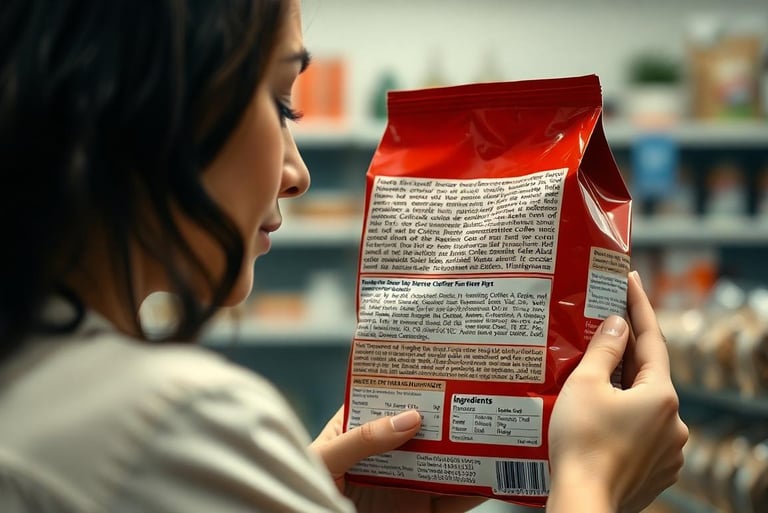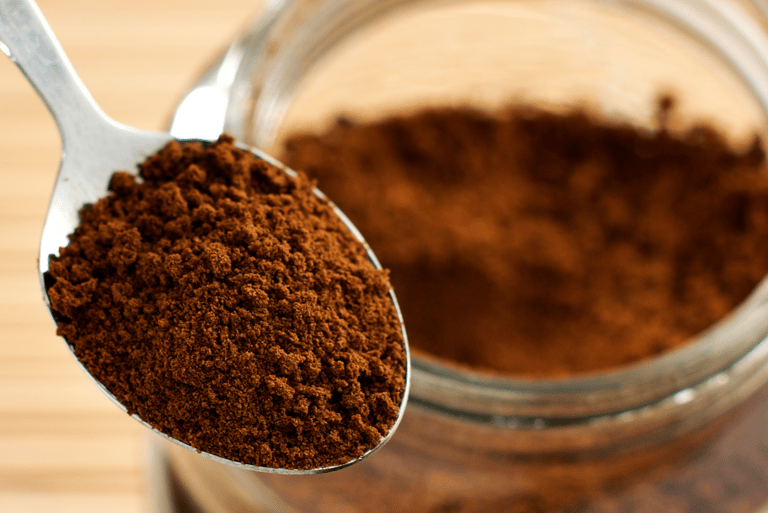Is Instant Coffee Bad for You? Separating Myths from Facts
Is instant coffee bad for you? Learn the facts about its benefits, potential risks, and what you should know before your next cup.
BEVERAGES & COCKTAILS
Shari Smith
3/16/202512 min read
This post may contain affiliate links, and I may earn a commission if you choose to make a purchase through them.


Instant coffee has become a staple for busy mornings and quick caffeine fixes. Loved for its simplicity, it’s the go-to brew for millions worldwide.
But is this convenient cup doing more harm than good? The truth is, instant coffee isn't inherently bad for you.
It shares many of the same health benefits as freshly brewed coffee, though it does come with some differences you'll want to know about.
From lower caffeine content to a higher level of acrylamide, there are both pros and cons to consider. So, before you sip your next cup, let’s look at the facts and debunk the myths.
What Is Instant Coffee?
Instant coffee, often hailed as the epitome of convenience, has become a hit for coffee drinkers who don't want to compromise on time.
It's essentially coffee reinvented—a dehydrated form made to dissolve instantly when mixed with water. From early mornings to outdoor camping trips, its simplicity has made it a global favorite.
But how exactly is it made, and how does it stack up against traditionally brewed coffee?
The Science Behind Instant Coffee Production
The creation of instant coffee is more than just drying coffee; it’s a remarkable blend of science and efficiency.
The process starts much like your regular cup of joe: real coffee beans are roasted, ground, and brewed into a concentrated extract. Next, this liquid undergoes drying through one of two methods:
Spray-Drying: Here, the coffee extract is sprayed into a chamber of hot air. The water evaporates rapidly, leaving behind a fine coffee powder. This process is quick but can affect the coffee's aroma.
Freeze-Drying: This is a slower, more expensive method that preserves flavor and aroma. The coffee extract is frozen into solid granules, then the water is removed through vacuum sublimation. What’s left are crystal-like granules that's both visually appealing and packed with rich flavor.
Through these methods, instant coffee granules are engineered to dissolve quickly, delivering a cup of coffee in seconds.
However, these industrial processes can alter its chemical makeup. The drying methods often strip some of the heat-sensitive volatiles responsible for coffee's complex aroma.



Is Instant Coffee Bad for You ? - Coffee Facts That You MUST Know!!!
Watch Video...
How Instant Coffee Differs From Brewed Coffee
Instant coffee and brewed coffee share common roots but diverge significantly by the time they reach your cup. Let's compare:
Taste and Aroma: Brewed coffee, made from freshly ground beans, teems with vibrant, complex flavors. Instant coffee, though respectable, often loses some of these dimensions due to the drying process. Think of it as the difference between freshly squeezed orange juice and a store-bought concentrate.
Texture: Brewed coffee feels smooth and full-bodied due to the natural oils and fine particles suspended in the liquid. Instant coffee, being fully dissolved, has a “cleaner” but thinner texture.
Caffeine Content: Instant coffee usually contains less caffeine than its brewed counterpart, clocking in at about 30–90 mg per cup compared to 70–140 mg in a typical fresh brew. For those monitoring their caffeine intake, this can be a subtle advantage.
Antioxidants: Coffee is a rich source of antioxidants, which have numerous health benefits. Instant coffee retains many of these but generally at slightly lower levels than freshly brewed coffee. On the flip side, instant coffee contains higher levels of acrylamide, a compound linked to high-temperature processing that some people aim to avoid.
Preparation Time: This is where instant coffee shines. While brewing a traditional cup can take 5–10 minutes, a mug of instant coffee can be ready in under 30 seconds. Perfect for hectic mornings or when you're short on time.
When it comes down to it, choosing between instant or brewed coffee often depends on what you prioritize—flavor and complexity or speed and convenience. Instant coffee may not carry the depth of fresh brew, but it excels in simplicity, making it a popular choice for everyday coffee drinkers worldwide.


Nutritional Content of Instant Coffee
Instant coffee packs a punch of convenience, but its nutritional profile is often a point of curiosity. How does it stack up against brewed coffee?
It turns out that instant coffee has some interesting characteristics that both casual drinkers and health enthusiasts should know about. Let’s break it down.
Caffeine Levels: Instant vs. Brewed Coffee
Instant coffee and brewed coffee share common roots but diverge significantly by the time When it comes to caffeine, instant coffee has noticeably less than brewed coffee.
A single cup of instant coffee contains about 30–90 mg of caffeine, while brewed coffee typically ranges between 70–140 mg.
Why the big difference? It comes down to preparation methods. Instant coffee is made from a concentrated extract that’s dried, and the process often leads to a slightly lower caffeine concentration.
For some, this is actually good news. If you’re sensitive to caffeine or want to avoid the jitteriness of a strong brew, instant coffee can offer a gentler energy boost.
However, if you’re someone who drinks coffee for that quick jolt of focus and energy, you might find the caffeine levels in instant coffee underwhelming.
Brewed coffee, with its higher caffeine content, can provide a stronger pick-me-up.


Presence of Acrylamide in Instant Coffee
Instant coffee and brewed coffee share common roots but diverge significantly by the time Here’s where instant coffee gets a bit of a bad rap: its acrylamide content.
Acrylamide is a naturally-occurring chemical that forms when coffee beans are roasted at high temperatures.
While both brewed and instant coffees contain acrylamide, instant coffee tends to have higher levels—up to twice as much.
This raises concerns because acrylamide has been classified as a potential health risk due to its links to nerve damage and an increased risk of cancer in animal studies.
That said, the levels of acrylamide in coffee—including instant—are quite low and generally fall within safety guidelines.
So should acrylamide stop you from enjoying your daily cup of instant coffee? Not necessarily.
While it’s always wise to be mindful of what you consume, drinking coffee in moderation isn’t likely to pose significant health risks for most people.
It’s more about being informed and balancing your intake with other healthy habits.


Antioxidants and Health Benefits
Coffee is renowned for its antioxidants, and instant coffee doesn’t miss out in this department.
Antioxidants, which combat oxidative stress in the body, are linked to reducing inflammation and lowering the risk of chronic diseases.
Instant coffee holds a fair share of these beneficial compounds, making it more than just a convenience option.
However, the antioxidant levels in instant coffee are slightly lower than in brewed coffee. This drop occurs because instant coffee undergoes additional processing, which can reduce the amount of natural antioxidants preserved.
Still, for those who prioritize ease over gourmet flavor, instant coffee remains a good source of antioxidants.
Here’s the takeaway: any coffee—instant or brewed—offers some level of health benefits.
Studies have linked coffee consumption to a lower risk of type 2 diabetes, improved brain function, and even protection against certain neurodegenerative diseases like Alzheimer’s.
While instant coffee might take a hit for its higher levels of acrylamide and slightly fewer antioxidants, it certainly isn’t lacking in health-promoting properties.
In fact, the balance of caffeine, antioxidants, and convenience makes it an attractive option for many.


Potential Health Risks of Instant Coffee
While instant coffee is undeniably convenient and widely enjoyed, it’s not without potential health concerns. Understanding these risks can help you make more informed choices about your daily cup. Let’s explore some of the most common concerns.
Is Acrylamide Harmful?
Acrylamide, a chemical that forms during high-temperature roasting, is present in all types of coffee. However, instant coffee tends to have significantly higher levels—often double that of brewed coffee.
Why does this matter? Acrylamide has drawn attention from health experts for its potential risks. Animal studies suggest it could be linked to neurotoxicity and a higher risk of cancer when consumed in large quantities.
Does this mean your morning coffee is dangerous? Not necessarily. The levels found in instant coffee are generally low, falling within safety guidelines set by regulatory authorities like the FDA and WHO.
To put it into perspective, you’d have to drink an excessive amount of coffee daily for years to approach dangerous acrylamide exposure levels.
Nonetheless, regular consumers of instant coffee may want to moderate their intake or balance it with brewed alternatives to err on the side of caution.


Additives and Their Impacts
Some instant coffees contain additives, such as emulsifiers, flavor enhancers, or added sugars, for taste improvement and shelf stability.
These ingredients are generally safe in small amounts, but consuming them habitually could affect your health over time.
Added sugars, for instance, can contribute to weight gain, type 2 diabetes, or even heart issues if taken in excess.
Similarly, flavored instant coffee products may contain artificial sweeteners or chemical stabilizers that, although approved for consumption, may not be ideal for everyone.
If you love flavored or pre-mixed versions, check the labels. Look out for high levels of additives or unnecessary calories that could turn your quick coffee fix into a less healthy option.
To make a better choice, opt for pure, unsweetened instant coffee. That way, you have control over what goes into your cup—whether that’s a splash of milk or a teaspoon of your preferred sweetener.


Concerns for Sensitive Groups
Instant coffee isn't a one-size-fits-all beverage, particularly for certain groups of people. For instance:
Pregnant Women: Health experts recommend limiting caffeine intake during pregnancy to about 200 mg per day, as excessive caffeine has been linked to low birth weight and an increased risk of miscarriage. Since instant coffee often contains less caffeine (approximately 30–90 mg per cup), it may seem like a safer option. However, it’s still a good idea to monitor total daily consumption, especially when combined with other caffeinated products.
Caffeine-Sensitive Individuals: For people sensitive to caffeine, even a relatively small amount can lead to unwanted side effects like jitteriness, rapid heartbeat, or insomnia. Instant coffee, with its variable caffeine levels, might be tricky to manage. Mild blends or decaffeinated options can be preferable choices here.
People with Digestive Issues: Instant coffee tends to be more acidic, which could exacerbate acid reflux or stomach irritations for those with sensitive digestive systems. If you’re prone to stomach discomfort, you might want to minimize instant coffee intake or pair it with food to reduce its acidic impact.
By paying attention to individual needs and health conditions, you can enjoy instant coffee in ways that work for you.
Whether it’s choosing lower-caffeine options or avoiding products with unnecessary additives, being mindful goes a long way toward maintaining a balanced approach to coffee consumption.


Health Benefits Linked to Instant Coffee
Instant coffee is not just about convenience—it also offers a surprising range of health benefits.
Whether you enjoy it for a quick boost in the morning or as a mid-afternoon pick-me-up, this popular beverage could be doing more for your body than you think.
From improving brain function to helping with weight management, let’s unpack the ways instant coffee supports your health.
Mental and Cognitive Boost
Ever feel your brain “wake up” after a cup of coffee? That’s no coincidence. The caffeine in instant coffee stimulates the central nervous system, improving alertness, concentration, and reaction times.
Regular, moderate coffee consumption has also been linked to a lower risk of Alzheimer’s and Parkinson’s diseases, thanks to caffeine's protective effects on brain health.
Instant coffee also contains antioxidants, which reduce oxidative stress in the brain. This can help maintain proper cognitive functions as you age.
For anyone navigating a demanding schedule, instant coffee could be more than just an energy booster—it might also sharpen your mental clarity when you need it the most.


Lower Risk of Diseases
Drinking coffee, including instant coffee, has been associated with a reduced risk of several chronic diseases. Studies show that people who drink coffee regularly may have:
A lower risk of type 2 diabetes: The antioxidants in coffee, particularly chlorogenic acid, may help regulate blood sugar levels. This makes it beneficial for preventing insulin resistance.
Improved liver health: Coffee drinkers are less likely to develop liver conditions, such as fibrosis, cirrhosis, and even certain types of liver cancer.
Reduced risk of Parkinson’s disease: Researchers have found that the caffeine in coffee helps lower the odds of developing this neurodegenerative condition, potentially due to its brain-protective properties.
Instant coffee provides these disease-fighting benefits in a simple, easy-to-make form. Whether you’re enjoying a hot cup at home or while rushing out the door, you’re giving your body some extra protection against long-term health issues.


Metabolism and Weight Management
Coffee lovers often talk about how their morning brew helps “kickstart” the day, and for good reason. Instant coffee can stimulate your metabolism.
Caffeine has been shown to increase your metabolic rate, helping your body burn calories more efficiently—even when resting.
For those focused on losing or managing weight, coffee may also act as a mild appetite suppressant. This means you’re less likely to snack excessively throughout the day.
More so, instant coffee’s ease of preparation allows you to enjoy its benefits without turning to sugar-loaded specialty drinks that add unnecessary calories to your daily intake.
While it isn’t a magic bullet for weight loss, incorporating instant coffee into a healthy lifestyle—balanced with diet and exercise—can complement your efforts.
Think of it as a tool to support your goals, one satisfying sip at a time.


Is Instant Coffee Right for You?
Instant coffee is one of the simplest ways to enjoy a caffeine fix, but it sparks mixed feelings. Some love the convenience; others question its health effects and flavor.
Is it better or worse than brewed coffee? Can it fit a healthy lifestyle? Let’s take a closer look.
Comparing Instant Coffee to Brewed Coffee
When deciding between instant and brewed coffee, it's important to weigh their health impacts, taste, and affordability.
Health Impacts Both instant and brewed coffees are packed with antioxidants associated with reducing inflammation and chronic disease risks. However, instant coffee tends to have slightly less due to its processing. It also has higher acrylamide levels – a chemical formed when roasting coffee beans – but the amounts are generally considered safe for most people when consumed in moderation. On the flip side, instant coffee typically contains less caffeine (30–90 mg per serving compared to 70–140 mg in brewed coffee), making it gentler for those needing a caffeine-controlled diet.
Taste Brewed coffee shines with its bold and full-bodied flavors, especially when freshly ground and brewed. Instant coffee, while much improved over the years, can taste slightly flat or bitter due to the manufacturing techniques, including spray-drying or freeze-drying. It’s an option that sacrifices a bit of complexity for the sake of convenience—more like TV dinners than chef-cooked meals.
Economic Value Instant coffee is cost-effective, thanks to its extended shelf life and easy preparation. It’s often less expensive than regularly brewing fresh coffee, especially when you consider costs like grinders, filters, and coffee makers. For budget-conscious drinkers or those with a hectic lifestyle, instant coffee saves time and money.
Ultimately, the choice between instant and brewed coffee depends on priorities. Need speed and simplicity? Instant coffee is your friend. Crave depth and richness? Brewed coffee is the better option.


How to Consume Instant Coffee Healthily
While instant coffee is convenient, there are ways to ensure it’s part of a balanced lifestyle. Here are some tips for a healthier cup:
Choose Pure Products: Stick with plain, unsweetened instant coffee to avoid extra calories and additives often found in flavored or pre-mixed options.
Limit Sugar and Cream: Adding sugar, flavored syrups, or creamers can turn your coffee into a dessert. Opt for natural sweeteners like honey or low-fat milk if you need extra flavor.
Moderate Your Caffeine Intake: Aim for no more than 3–5 cups daily. By balancing morning and afternoon consumption, you’ll enjoy the benefits without overloading your system.
Watch for High Acrylamide Products: Though the levels in instant coffee are generally within safe limits, mixing in brewed coffee some days can diversify your coffee habits while lowering exposure.
Hydrate Alongside Your Coffee: Coffee acts as a mild diuretic. Pair it with water to ensure you stay properly hydrated throughout the day.
By making small adjustments, you can enjoy instant coffee while supporting your overall well-being. Convenience doesn’t mean compromise when it’s handled thoughtfully.


Conclusion
Instant coffee isn’t a villain in your cup—it’s a practical, enjoyable option for millions worldwide. Like brewed coffee, it provides antioxidants, potential health benefits, and a reliable energy boost.
However, its slightly lower nutrient profile and higher acrylamide levels might give health-conscious drinkers something to consider.
Moderation is key. Drinking instant coffee as part of a balanced diet is unlikely to harm your health, especially if you opt for plain varieties without added sugars or flavors.
Whether it’s a busy morning or a quick pick-me-up, this convenient choice caters to modern lifestyles without needing to sacrifice much.
What matters most is finding what works for you. Are you someone who values flavor, or do simplicity and speed fit your rhythm better?
Either way, there’s no need to overthink your choice—just enjoy your coffee with confidence.
Southern Spice Homestyle Delights © 2025. All rights reserved.
Address
Rayville, La 71269
Want more from Southern Spice?


Get recipes, cooking inspiration, and exclusive information right to your inbox!
Categories










